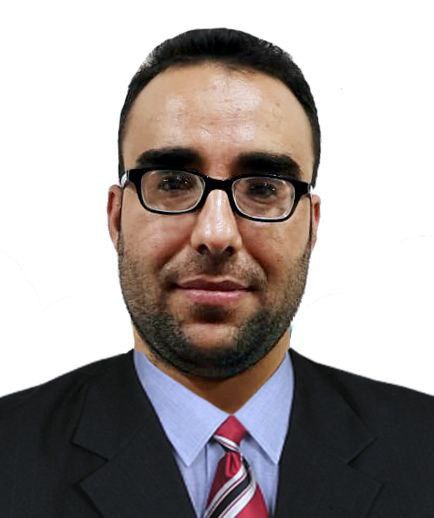
Assad Ibrahim Alhayali
Research InterestsAgricultural economics; agricultural production economics; agricultural foreign trade policies; agricultural machinery and equipment economics
| Gender | MALE |
|---|---|
| Place of Work | Technical Agricultural College |
| Position | Responsible for the Documents and Higher Certificates Unit |
| Qualification | Ph.d |
| Speciality | Agricultural economy |
| mti.lec149.assad@ntu.edu.iq | |
| Phone | 07503633135 |
| Address | Mosul, Mosul, Mosul, Iraq |

Lecturer at the Northern Technical University - Agricultural Technical College/Mosul
Bachelor's degree in Agricultural Sciences from the College of Agriculture and Forestry, University of Mosul, 2011
Master's degree in Agricultural Economics from the College of Agriculture and Forestry, University of Mosul, 2014
PhD in Agricultural Sciences/Agricultural Economics from the College of Agriculture, Tikrit University, 2022
He held several positions at the Agricultural Technical College, including Director of the Studies and Planning Department, Rapporteur of the Medicinal Plants and Natural Products Technology Department, Head of the Documents and Higher Certificates Unit, and Liaison Member of the Documents and Higher Certificates Issuance Health Platform.
He participated in the chairmanship and membership of many important committees in the College of Agricultural Technology, including:
1- Strategic Plan Preparation Committee
2- Institutional Accreditation Standards Implementation Committee
3- Institutional System Accreditation Follow-up Committee
4- Preparatory Study Documents Audit Committee
5- Evening Study Fund Inventory Committee
6- Postgraduate Examinations Audit Committee
7- Formal Committee for Reviewing Master's Theses
8- Committee for Reviewing Tuition Fees in the Attempts System
9- Committee for Reviewing Postgraduate Applicant Applications
10- Preparatory Committee for the First Agricultural Conference at the College of Agricultural Technology
11- Committee for Establishing the Advisory Office at the College of Agricultural Technology
12- Committee for Establishing the College of Agricultural Polytechnics
13- Committee for the Establishment of the Department of Biotechnology and Food Sciences. He also participated in the Scientific Committee for the Department of Medicinal Plants and Natural Products Technologies, the Department of Desertification Control Technologies, the Examination Committees, and the Institutional Accreditation Committees, and was a member of the Curriculum Update Committee.
He has more than nine published research papers in various journals (Scopus, international, and local), and several unpublished research papers and books in progress. He has participated in numerous training courses, scientific seminars, and workshops in his field of specialization.
He has taught many courses including Natural Resource Economics, Agricultural Statistics, Computer Applications, Agricultural Machinery and Equipment Economics, Water Management, Oil and Aromatic Crops, Agricultural Marketing, Democracy and Human Rights, and Agricultural Economics.
Received many letters of thanks and appreciation from the Iraqi Prime Minister, His Excellency the Minister of Higher Education and Scientific Research, the President of the Northern Technical University, the Dean of the College of Agricultural Technology, and the Dean of the Technical Institute/Mosul.
Skills
Economics of agricultural production (95%)
Agricultural marketing (85%)
farm business management (85%)
Agricultural foreign trade policies (80%)
Microsoft Office (75%)
Academic Qualification
Master of Agricultural Sciences - Agricultural Economics - University of Mosul – Iraq
Sep 15, 2011 - Jan 19, 2014A master's thesis focusing on the reality of strategic grain trade in some developing countries under the influence of globalization policies.
PhD in Agricultural Sciences - Agricultural Economics - University of Tikrit - Iraq
Sep 15, 2019 - Jul 4, 20222022
PhD research focusing on the economic and econometric analysis of honey production projects in Nineveh Governorate for the 2021 production season.
Bachelor of Agricultural Sciences - Agricultural Economics - University of Mosul - Iraq
Sep 15, 2006 - Jul 4, 2010Graduation research focusing on the economics of agricultural production
Working Experience
Studies and planning [Director of the Studies and Planning Division]
Sep 1, 2023 - Aug 31, 2024Worked as Director of the Studies and Planning Department at the Technical Agricultural College - Mosul / Northern Technical University
Department of Medicinal Plants and Natural Products Technologies [Assistant Department of Medicinal Plants and Natural Products Technologies]
Mar 1, 2024 - Dec 1, 2024Worked as an assistant in the Department of Medicinal Plants and Natural Products Technologies
Higher Documents and Certificates Unit [Head of the Higher Documents and Certificates Unit]
Mar 23, 2023 - PresentWorked as an official of the Documents and Higher Certificates Unit at the Technical Agricultural College - Mosul / Northern Technical University
Platform for the issuance of documents and higher certificates [Platform for the issuance of documents and higher certificates]
Mar 23, 2023 - PresentWorked as a liaison member in the platform for issuing documents and higher certificates at the Technical Agricultural College - Mosul / Northern Technical University
Publications
The Economic Feasibility for Operating the Algerian Combine Harvester PMA at Nineveh Area Conditions
Aug 28, 2024Journal International Journal of Research and Innovation in Social Science (IJRISS)
publisher Assad Ibrahim Alhayali
DOI https://dx.doi.org/10.47772/IJRISS.2024.808025
Issue VIII
Volume VIII
The study was conducted in Nineveh Governorate by conducting a comparison of agricultural crops (wheat, barley, lentils) for the seasons (2014 – 2015 – 2016) to determine the economic feasibility of operating the Algerian combine harvester (PMA) and its impact on some of the factors and characteristics studied. (A. Maintenance before operation B. Maintenance during operation C. Oils, greases and fuel, D. Transportation costs E. Food costs F. Costs of technicians and administrators G. revenues from the three crops) The data was analyzed according to the design (R.C.B.D.) and the results were as follows: A. The year 2016 recorded the lowest pre-operation maintenance cost, reaching 862000 dinars, while the year 2014 recorded the highest value, reaching 863667 dinars, B. The year 2014 recorded the lowest value, reaching 647667 dinars, while the year 2016 recorded the highest value, reaching 920933 dinars, C. The year 2014 recorded the lowest value, reaching 210000 dinars, while the year 2016 recorded the highest value, reaching 633667 dinars, D. The year 2016 recorded the lowest value, reaching 378333 dinars, while the year 2015 recorded the highest value, reaching 718667 dinars, E. The year 2016 recorded the lowest value, reaching 171466 dinars, while the year 2016 recorded the highest value, reaching 232000 dinars, F. The year 2016 recorded the lowest value, reaching 139133 dinars, while the year 2015 recorded the highest value, reaching 917000 dinars, G. The year 2015 recorded the highest value of revenues for crops, respectively (wheat, barley, lentils), while the year 2016 recorded the lowest value of revenues for crops, respectively (wheat, barley, lentils).
Economics of Bee Honey Production in Nineveh Province for the Production Season 2021
Aug 1, 2023Journal NTU Journal of Agricultural and Veterinary Sciences
publisher Assad Ibrahim Alhayali
DOI https://doi.org/10.56286/ntujavs.v3i2.526
Issue 3
Volume 2
The weakness of technical and economic knowledge of beekeepers is one of the factors affecting profit as well as the optimum production volume achieved for economic efficiency, which led to economic problems, among those problems is the decrease in the quantities supplied from bee honey production. The research aimed at studying the most important factors affecting the profit function as well as estimating the function production costs. Cross-sectional data were used in the light of a random sample that included (120) beekeepers from Nineveh Governorate. The results of estimating the profit function showed that the parameters of the function agreed with the logic of the economic theory and the statistical and standard tests. It was shown by the size of the parameters of the function that the amount of output has a great importance in profit compared with the rest of the price variables and the average production costs. As for the ratio for estimating the function of total costs, the results of the study showed that the cubic model is the most suitable for the relationship adopted in the study according to economic theory and statistical and standard tests. Depending on the cost function only, the volume achieved for the economic efficiency of honey production was obtained at the level (10,386) kg / cell. The study also showed that the technical efficiency in honey production amounted to (86%), as well as the estimation of the maximum production volume for honey in the short term, which amounted to (13.885). We infer from the study that the economic resources used in the production process were not optimally invested, which led to a decrease in production efficiency. The results of the study recommend working to follow production policies aimed at increasing the economic efficiency of a single cell and achieving optimal use of available resources, which is reflected in an increase in efficiency in the use of productive resources and an improvement in the efficiency of honey production.
THE EFFECTS OF GLOBALIZATION POLICIES IN GRAINS STRATEG IC TRADING IN SOME DEVELOPING COUNTRIES FOR THE PERIOD 1985-2012
Aug 1, 2017Journal Mesopotamia J. of Agric.
publisher Assad Ibrahim Alhayali
Issue 4
Volume 45
There was many Opinions that studied the impact of policies of economic globalization in the grain trade strategy in developing countries, some of these pointed out that the policies of globalization, a big benefit in the economies of developing countries and in the grain trade strategy in these countries as it helps them to see the international economic decision and increase the interest standard specifications as well as other benefits can be utilized in various economic fields. Other opinions pointed out that the policies of economic globalization worked to lower the share of grain exports strategy of developing its gross domestic product increased its imports which brings the rate of trade in non-interest of developing countries, the opposite of its impact on the poor distribution of national income on national and global levels , which increased the under development of developing countries and contributed to the progress of developed countries; In this regard our study adopted on the premise that the policies of economic globalization have different impacts in the grain trade strategy in developing countries by the nature of their economic structures and efficiency of their systems to deal with these policies, in order to prove the hypothesis of this search we studied on a sample of developing countries including (Egypt, Indonesia, Malaysia, Morocco, Tunisia, Turkey), where four strategy crops is (wheat, barley, rice, corn), had been selected and which has been relying on time-series data in the estimation of the phenomenon under Find and each country individually they reflect changes in the grain trade strategy according to their characteristics and attributes differ from one country to another.














